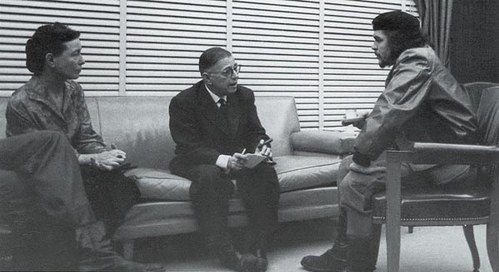
Left behind was the romantic stage, when a notable majority of leftist intellectuals pinned their hopes on the Revolutionary hurricane of Fidel Castro and Che Guevara.
A Cuba that clouded the reason of heavyweights in the world of letters such as Jean Paul Sartre, Julio Cortázar and José Saramago has lost its steam.
The “snob appeal” and the novelty of hundreds of poets, painters, musicians casually strolling through the streets of Havana in the ’60s, surrounded by the bustle of soldiers, where there was no hour for appointments and conversations could well last three days and two nights, said adiós long ago.
Gone to a better life are the talks on Castro’s yacht, spear fishing and drinking rum, while the guerrilla commander, with his ever-present cigar and his mania for talking without listening to others, spoke of his lavish plans that would convert the sugar-cane island into a Caribbean paradise.
Like every Utopia, it collapsed. The Cuban government no longer casts a spell on the planet’s intellectuals. It started to play hardball. The Revolution was institutionalized in the ’70s and then came the Five Grey Years. Along with the ridiculous plans dictated by the bureaucrats. The illusion died.
Cuba allied itself to the USSR and some intellectuals were condemned to ostracism, for being gay or for not reflecting the epic deeds of Castro and his Revolution in their works.
Then Real Socialism took over almost all aspects of Cuban cultural life. The pavones* came to the fore and guys such as Heberto Padilla were in prison. Giants such as Lezama or Virgilio Piñera were regarded with disfavor. Mediocre writers like Manuel Cofiño were applauded.
Some European and Latin American intellectuals broke the unwritten agreement of support and devotion for Fidel Castro. Vargas Llosa threw the first stone. It was not taken well, because a majority of the notable men of letters still believed in the righteous work of the bearded Caribbean.
In Franco’s Spain, “liberals” like the Seville attorney Felipe González and a colorful club of Iberian thinkers and artists read the extensive speeches of Castro in one sitting.
Che was an icon. To visit the shrine of the Cuban Revolution was more exciting than a tour of Paris.
Havana began its decline. Slowly it lost its allure as a dazzling metropolis. Cutting cane was an obligation for Cubans and a hobby for foreigners. Indeed, scarcities mounted and buses were rare. People dressed as in Mao’s China, but an entire people tightened their belts and pledged to take heaven by storm.
By the ’80s, the enchantment was gone. Bad news reached the dreamy European intellectuals: Cubans also wanted to earn money, dress well, wear name-brand perfumes, drive nice cars, travel the world as tourists and visit Disneyland.
Despite Cubans’ capitalist aspirations, artists in the style of Víctor Manuel, the Catalan Joan Manuel Serrat or Joaquín Sabina continued to appreciate the son of a Galician soldier who had gone to the island to preserve, at any price, the most precious jewel in the Spanish crown.
With the fall of the Berlin Wall and the disappearance of the once powerful Soviet Union, hundreds of leftist intellectuals began to look at Cuba through a magnifying glass. It was obvious: There were no presidential elections. Castro started to see himself like a newly minted Napoleon, sending his troops to different African countries.
If you have opinions which differ from those of the government, you could go to prison. And the people continue to live badly and eat little, with a ration book in force since 1962. Hundreds jumped the fence of an embassy, or launched themselves in a rickety raft on a shark-filled sea, looking for freedom and a better life on the other shore.
And now we come to the 21st century. Castro continued the same. Blinded by his Numantian position and imprisoned opponents. In 2003, the Portuguese José Saramago said, “Up to this point, I’ve gone along.” Spanish musicians, artists and intellectuals also grew tired of applauding the comandante, who now seemed like an old fraud. They didn’t care if the fault was Fidel Castro’s or the United States’. That fact is that many decided not to return to Cuba.
The death of Orlando Zapata Tamayo, political inertia, economic disaster, and the desire among a growing part of Cuban society for political changes, set off alarms and touched the sensibilities of European intellectuals.
Now the Revolution is cornered by the criticisms of cultured people throughout the world. Ana Belén slammed the door. Bosé and Juanes don’t see the situation clearly. And though still wearing kid gloves, they are aware that something is not working on the island.
Every day there are more desertions from the army of admirers of the olive-green Revolution. Few are left. Eduardo Galeano in Uruguay. A silent and ill García Márquez who says nothing, more from loyalty and friendship for Castro than from conviction.
The truth is that those who currently blindly support the Castro brothers are a tiny chorus. The great and famous flew away several springs ago.
*Translator’s note: “Pavon” means “peacock” and also refers to Luis Pavon Tamayo who headed the Cuban Culture Council during this time of heavy censorship.
January 1, 2011
